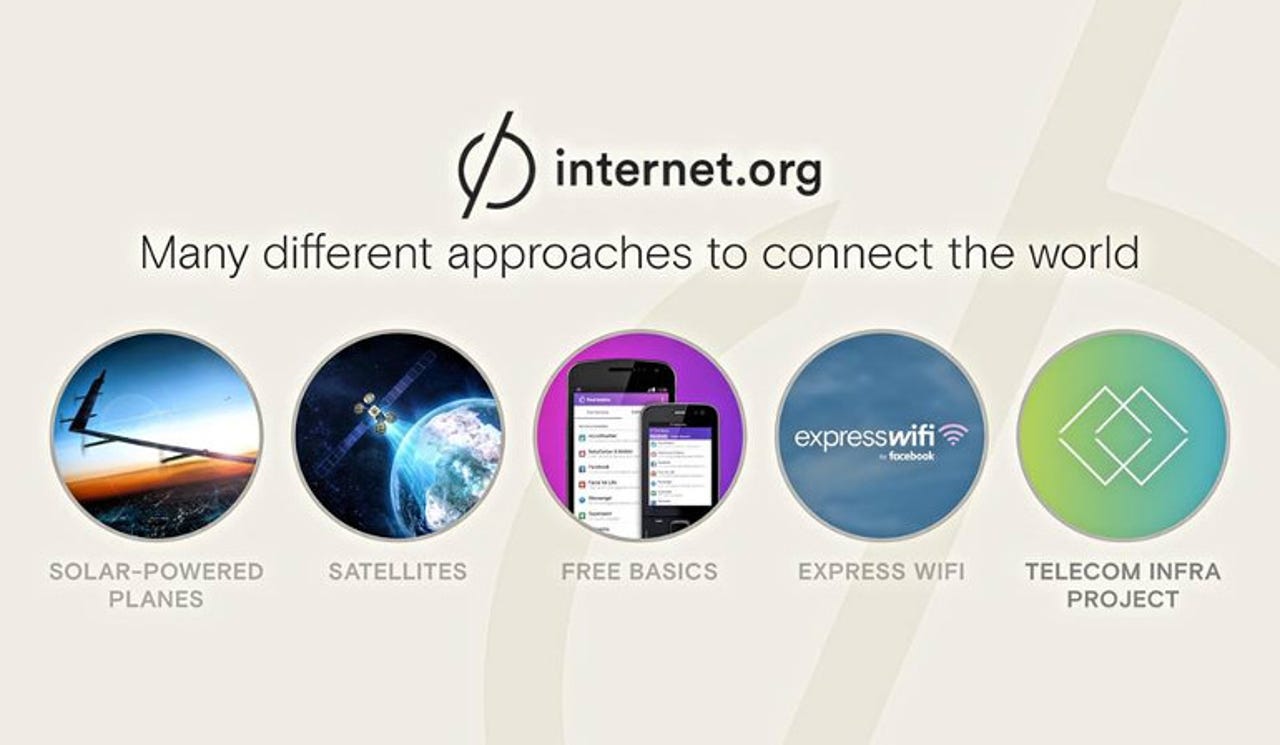Drones, satellites and lasers, oh my! Facebook's internet plans

Facebook CEO Mark Zuckerberg has a plan. He wants to bring the developing world online with a vastly improved internet infrastructure using drones, satellites and lasers.

Facebook seeks to cover the globe with broadband Internet with its new projects.
Zuckerberg has been working on this for some time. But at a Mobile World Congress (MWC) 2016 keynote, he outlined more of the plans and partnerships he'll need to make this happen.
The first part of that plan, Free Basics, only offered access to pre-approved services, such as, of course, Facebook. That plan went over like a lead balloon. Indeed, in India, Facebook was fored to shut down its Free Basics project.
Zuckerberg still thinks "Everyone in the world should have access to the internet." His new project, Telecom Infra Project (TIP), will seek to improve the underlying infrastructure that supports the internet.
Zuckerberg said, "We're taking the next step by partnering with telecom companies to develop new technologies that will reduce the cost of building mobile networks all over the world."
Smartphones
Specifically, Facebook is working with more than 30 partners. These include Deutsche Telekom, Intel, Nokia and SK Telecom. Together they'll be developing new technologies that can help connect people faster and more efficiently by improving internet infrastructure. This is meant to help connect the unconnected in developing countries to 5G networks.
The basic pattern for Telecom Infra comes from Facebook's highly successful Open Compute Project. In a blog post, Jay Parikh, Facebook's Global Head of Engineering and Infrastructure, explained, "We know from our experience with the Open Compute Project that the best way to accelerate the pace of innovation is for companies to collaborate and to work in the open. To kick-start this work, TIP members such as Facebook, Intel, and Nokia have pledged to contribute an initial suite of reference designs, while other members such as operators Deutsche Telekom and SK Telecom will help define and deploy the technology as it fits their needs."
Specifically, "TIP members will work together to contribute designs in three areas -- access, backhaul, and core and management -- applying the Open Compute Project models of openness and disaggregation as methods of spurring innovation. In what is a traditionally closed system, component pieces will be unbundled, affording operators more flexibility in building networks." The ultimate goal is "to accelerate development of technologies like 5G that will pave the way for better connectivity and richer services."
The science-fiction parts of internet.org are still there. Zuckerberg still plans for a network of drones, satellites and lasers to connect the rural poor to the internet. At MWC Zuckerberg said that internet.org would launch its first satellite over Africa this year and "we are about to test flying internet drone solar planes that can fly three months a year."
Facebook's Aquila solar-powered drones have the wingspan of a 737 but with only a fraction of the weight. To complement Aquila, the drones will share data with lasers at speeds, according to Parikh, of tens of gigabytes of data per second
Facebook isn't the only one with high-flying plans for the internet. Google's SkyBender solar-powered drones have been making test-flights over New Mexico. The search giant is also working on Project Loon Internet balloons.
Sound crazy? Sounds like stuff of science-fiction? Well, it is the 21st century and our hunger for bandwidth has only grown. Soon, if not from Facebook, then from others, we will have universal broadband from satellites, drones and lasers.
Related Stories: